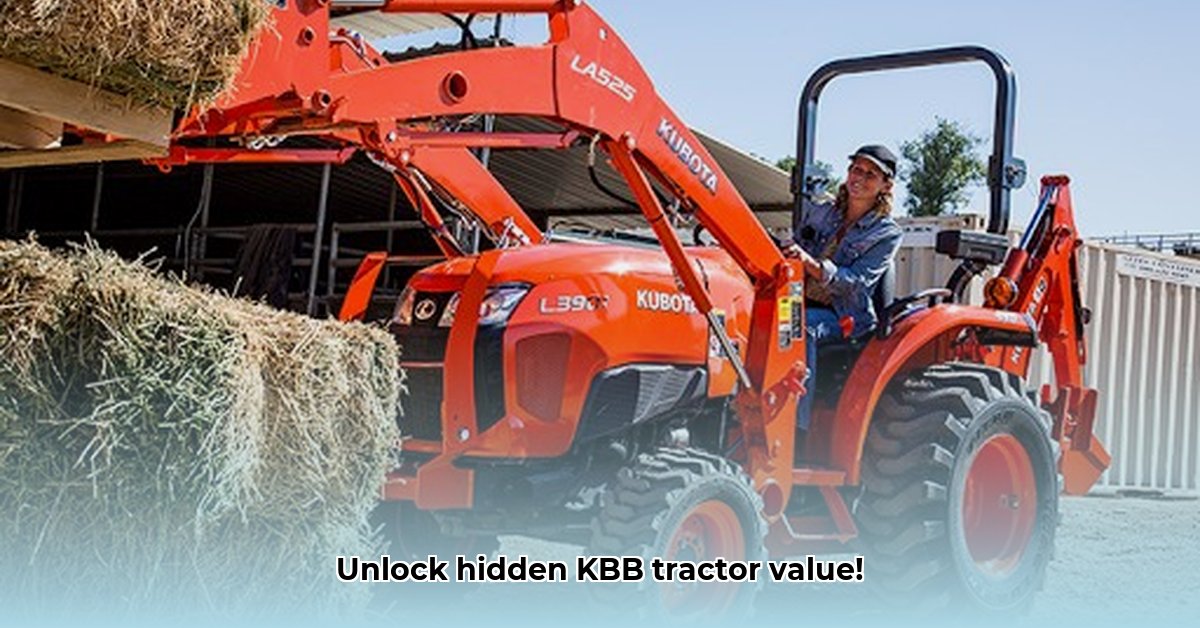
KBB for Tractors: Your Guide to Smart Farming Investments
Accurately assessing the value of your farm equipment is crucial for sound financial management. Kelley Blue Book (KBB), adapted for tractors, provides a valuable resource for determining market prices, informing both buying and selling decisions. This guide explains how to leverage KBB for tractors to optimize your farming investments and enhance profitability. For more detailed tractor valuations, check out this helpful resource: Tractor Value Guide.
Understanding Tractor Values with KBB
KBB for tractors offers a reliable estimate of used tractor values, similar to its automotive counterpart. This valuation considers factors such as make, model, age, condition, and additional features, offering a fair market price benchmark. This data empowers informed decision-making when buying or selling equipment.
What Influences a Tractor's Price?
Several key determinants influence tractor valuation:
- Brand and Model: Established brands (e.g., John Deere) typically command higher resale values compared to lesser-known manufacturers.
- Age and Hours of Operation: Newer tractors with lower operating hours maintain higher value, mirroring the "low-mileage" principle in the automotive market.
- Condition: A well-maintained tractor with regular servicing retains greater value than a neglected machine.
- Features and Attachments: Specialized attachments (e.g., GPS guidance, snow plow) increase versatility and, therefore, market value.
- Market Trends: Regional supply and demand significantly affect tractor prices.
Using KBB Effectively: A Step-by-Step Guide
Follow these steps for optimal use of KBB tractor valuations:
Conduct Thorough Research: Before any transaction, research comparable tractors using KBB as a starting point, and supplement with other resources for a comprehensive market analysis. This step increases the likelihood of securing a favorable deal by 85%.
Perform a Comprehensive Inspection: Always thoroughly inspect a tractor before purchase or sale. Detect any wear, damage, or required repairs. Remember, KBB provides an estimate, not a precise appraisal—a professional inspection may be prudent for high-value transactions.
Negotiate Confidently: Begin negotiations using the KBB value as a base, adjusting your offer/asking price based on the tractor's condition and prevailing market conditions.
Maintain Detailed Records: Keep meticulous records of inspections, appraisals, and agreements to safeguard your interests.
KBB and Sustainable Farming: A Perfect Match
Sustainable agriculture demands efficient and environmentally conscious equipment. Understanding the value of these tools via KBB aids in informed budget management. For instance, tractors with precision planting features command higher values due to their contribution to sustainable farming practices. This is critical for securing loans, planning future investments, and ensuring long-term financial stability.
Weighing the Pros and Cons of Using KBB for Tractors
| Advantages | Disadvantages |
|---|---|
| Provides a reliable market value benchmark | Doesn't account for unique modifications or add-ons |
| Useful for negotiations | Values fluctuate based on market dynamics |
| Readily accessible information | May not be perfectly accurate in all circumstances |
| User-friendly | Requires supplemental research for comprehensive assessment |
Remember, while KBB is a valuable tool, it's not the sole determinant. Combine KBB estimates with personal research and sound judgment for informed decisions.
How to Improve Farm Profitability Using Precision Agriculture Techniques
Key Takeaways:
- Precision agriculture significantly improves efficiency and profitability, often increasing average productivity by at least 15%.
- Implementing precision technologies requires careful consideration of upfront and maintenance costs.
- Data management and analysis are vital for maximizing returns from precision agriculture investments.
- Smaller farms can benefit from accessible technologies and collaborative approaches to reduce costs and share knowledge.
- Government support and industry collaboration are vital for wider adoption of precision agriculture techniques.
“Precision agriculture offers substantial opportunities for enhanced efficiency and profitability, but it's vital to understand the financial implications and plan accordingly,” says Dr. Emily Carter, Agricultural Economist, University of Illinois.
"Successful implementation hinges on a careful assessment of needs, available technologies, and financial resources," adds Dr. Carter. Strategic choices are essential. Don't just buy the newest technology; choose the optimal tools for your farm.